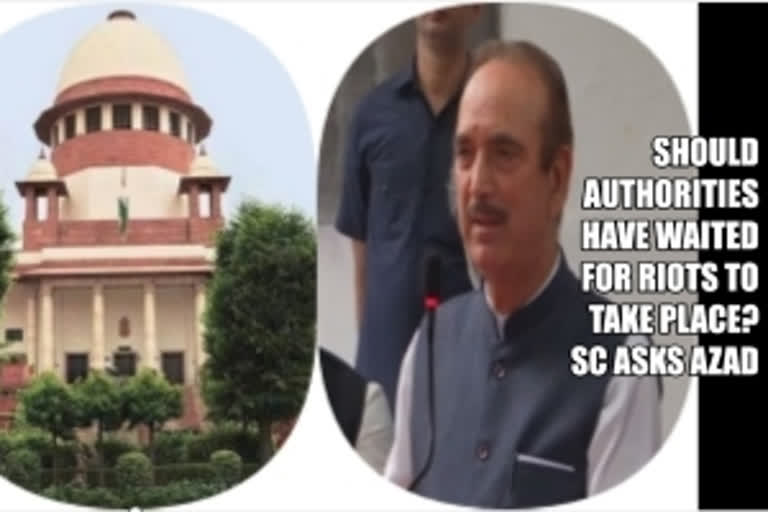New Delhi: The Supreme Court on Thursday questioned senior Congress leader Ghulam Nabi Azad on his opposition to the imposition of various restrictions following the abrogation of Jammu and Kashmir's special status, and asked if the authorities should have "waited for riots to take place".
"In an issue like this, why cannot apprehension be there that the entire area or the place may be disturbed?" a bench headed by Justice N V Ramana asked Azad's party colleague and counsel Kapil Sibal, who argued that it was a "colourable exercise of power" on the part of the authorities to impose restrictions, including on communication and transportation.
The senior advocate was arguing that without having materials to support their apprehensions about the danger to public tranquillity, the authorities cannot impose such restrictions.
He argued before the bench, also comprising justices R Subhash Reddy and B R Gavai, how the government can assume that the entire population would be against it and there would be law and order problem.
"In the 10 districts of the valley, was it necessary to paralyse seven million people like this? They have to show the materials," Sibal said, adding, "Here, we are not talking about rights of people of Jammu and Kashmir. We are talking about the rights of people of India."
He said that the authorities may have apprehensions about law and order problem there but they need to have materials to back their apprehensions.
The bench asked, "Should they have waited for riots to take place?"
Responding to this, Sibal said, "How can they assume that riots will take place? It shows there is an assumption in their minds and there are no materials. They can have intelligence input to say so."
He said that state has wide powers and if the situation arises, the authorities may impose section 144 (power to issue an order in cases of nuisance on apprehended danger) of the CrPC.
Sibal said it is the bounden duty of the State to protect not only the rights of citizens but also those who are in need.
"What is happening in Jammu and Kashmir, people of India are entitled to know," he said while referring to restrictions imposed on modes of communication there.
"This is a complete misuse of section 144 of CrPC. It is a colourable exercise of power. It is constitutionally impermissible," he said, adding, "You cannot say that everyone living in a district may disturb the peace."
He said in an extraordinary situation, it can happen but the authorities must-have materials to back their apprehensions.
He said that orders imposing restrictions were passed on August 4, a day before abrogation of provisions of Article 370 giving special status to Jammu and Kashmir.
"Why you have assumed that the entire population will be against this and on what basis?" he said during the arguments which would continue on November 14.
The bench then told Sibal, "If that is so, then there cannot be any section 144 at any place."
The apex court also said in case of a curfew imposed in an area, in some circumstances some people might suffer.
He said the government can impose restrictions in certain areas under section 352 (proclamation of emergency) but that has to be passed by Parliament.
Sibal said the State should have taken care of exigencies and steps to protect the fundamental rights, including that of livelihood, of the citizens.
He also argued that Jammu and Kashmir have suffered an economic loss of Rs 10,000 crore due to the restrictions imposed there.
During the hearing, Sibal also referred to the odd-even road rationing scheme which is presently in force in Delhi.
"Everything about the scheme is odd. Everyone do not have two cars or motorcycles," he said, adding that he had bought a hybrid car so that he could get an exemption, but this time it has not been exempted.
The bench said two-wheelers are exempted in the odd-even scheme.
It also said that women, who are driving four-wheelers and are not accompanied by men, are also exempted from the odd-even scheme.
The apex court had on September 16 allowed Azad to visit four districts in Jammu and Kashmir for assessing the impact on the life of daily wagers due to the situation prevailing after the abrogation of provisions of Article 370.
Azad's counsel had earlier told the court that there were reports that daily wagers involved in farming and working in apple orchards were facing serious problems and loss of livelihood due to the clampdown prevailing in the state.
His counsel had said that Azad had thrice tried to visit the state on August 8, 20 and 24, but was sent back from the airport itself.
In his petition before the top court, he has also sought permission to check on social conditions of the people after a clampdown was imposed by authorities following the scrapping of the state's special status.
Also Read: 4 killed following heavy snowfall in Kashmir



